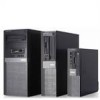Dell OptiPlex 960 Setup and Features Information Tech Sheet - Page 8
Mini Tower, Desktop, Small Form Factor, Service Manual - raid
 |
View all Dell OptiPlex 960 manuals
Add to My Manuals
Save this manual to your list of manuals |
Page 8 highlights
Drives (continued) Internally accessible: Mini Tower - two 3.5-inch hard disk drives (HDDs) or two 2.5-inch HDDs Desktop - two 3.5-inch HDDs or two 2.5-inch HDDs Small Form Factor - one 3.5-inch HDD or two 2.5-inch HDDs Available devices: Mini Tower - two external 5.25-inch bays, one external 3.5-inch bay, two internal 3.5-inch bays Desktop - one external 5.25-inch bay, one external 3.5-inch bay, one internal 3.5-inch bay NOTE: The desktop platform can accommodate two 3.5-inch HDDs, provided no floppy drive is used. NOTE: The desktop platform may use the internal 3.5-inch bay with two 2.5- inch HDDS or the external 3.5-inch bay as an additional internal 3.5-inch HDD bay for RAID configurations. Small Form Factor - one external 5.25-inch slimline bay, one external 3.5-inch slimline bay, one internal 3.5-inch bay NOTE: The CD/DVD drives are determined by the number of external 5.25-inch bays. Controls and Lights Front of computer: Power button push button Power light Blue light - Blinking blue in sleep state; solid blue for power-on state. Amber light - The blinking amber indicates a problem with the system board. A solid amber light when the computer does not start indicates that the system board cannot start initialization. This could be a system board or a power supply problem. Drive activity light Blue light - A blinking blue light indicates the computer is reading data from or writing data to the SATA hard drive or CD/DVD drive. Network link integrity light Blue light - A good connection exists between the network and the computer. Off (no light) - The computer is not detecting a physical connection to the network. Diagnostic lights (four) Blinking amber, solid amber, or off. Used to troubleshoot system issues. See your Service Manual for information about diagnostic light codes. Wi-Fi indicator Blue light - A solid blue light indicates the wireless network is powered on.












